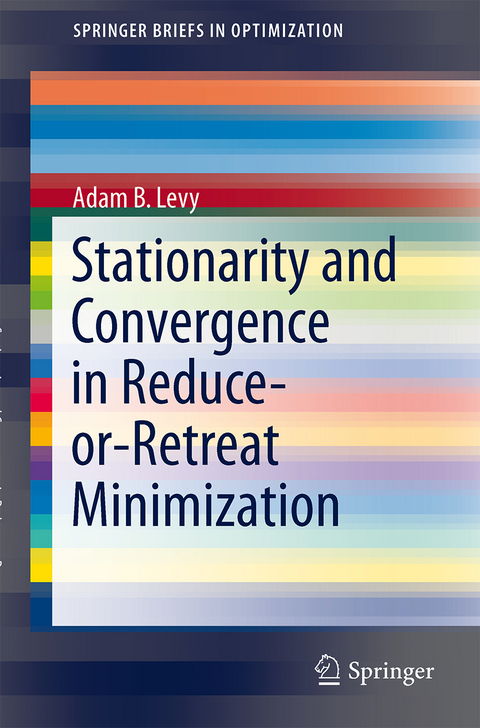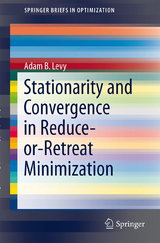Stationarity and Convergence in Reduce-or-Retreat Minimization
Seiten
2012
Springer-Verlag New York Inc.
9781461446415 (ISBN)
Springer-Verlag New York Inc.
9781461446415 (ISBN)
Presents and analyzes a unifying framework for a wide variety of numerical methods in optimization. This title covers various derivative-based methods within the same framework encourages the construction of new methods, and inspires new theoretical developments as companions to results from across traditional divides.
Stationarity and Convergence in Reduce-or-Retreat Minimization presents and analyzes a unifying framework for a wide variety of numerical methods in optimization. The author’s “reduce-or-retreat” framework is a conceptual method-outline that covers any method whose iterations choose between reducing the objective in some way at a trial point, or retreating to a closer set of trial points. The alignment of various derivative-based methods within the same framework encourages the construction of new methods, and inspires new theoretical developments as companions to results from across traditional divides. The text illustrates the former by developing two generalizations of classic derivative-based methods which accommodate non-smooth objectives, and the latter by analyzing these two methods in detail along with a pattern-search method and the famous Nelder-Mead method.In addition to providing a bridge for theory through the “reduce-or-retreat” framework, this monograph extends and broadens the traditional convergence analyses in several ways. Levy develops a generalized notion of approaching stationarity which applies to non-smooth objectives, and explores the roles of the descent and non-degeneracy conditions in establishing this property. The traditional analysis is broadened by considering “situational” convergence of different elements computed at each iteration of a reduce-or-retreat method. The “reduce-or-retreat” framework described in this text covers specialized minimization methods, some general methods for minimization and a direct search method, while providing convergence analysis which complements and expands existing results.
Stationarity and Convergence in Reduce-or-Retreat Minimization presents and analyzes a unifying framework for a wide variety of numerical methods in optimization. The author’s “reduce-or-retreat” framework is a conceptual method-outline that covers any method whose iterations choose between reducing the objective in some way at a trial point, or retreating to a closer set of trial points. The alignment of various derivative-based methods within the same framework encourages the construction of new methods, and inspires new theoretical developments as companions to results from across traditional divides. The text illustrates the former by developing two generalizations of classic derivative-based methods which accommodate non-smooth objectives, and the latter by analyzing these two methods in detail along with a pattern-search method and the famous Nelder-Mead method.In addition to providing a bridge for theory through the “reduce-or-retreat” framework, this monograph extends and broadens the traditional convergence analyses in several ways. Levy develops a generalized notion of approaching stationarity which applies to non-smooth objectives, and explores the roles of the descent and non-degeneracy conditions in establishing this property. The traditional analysis is broadened by considering “situational” convergence of different elements computed at each iteration of a reduce-or-retreat method. The “reduce-or-retreat” framework described in this text covers specialized minimization methods, some general methods for minimization and a direct search method, while providing convergence analysis which complements and expands existing results.
-1. A Framework for Reduce-or-Retreat Minimization. -2. Particular Reduce-or-Retreat Methods. -3. Scenario Analysis.
| Reihe/Serie | SpringerBriefs in Optimization |
|---|---|
| Zusatzinfo | 1 Illustrations, color; 2 Illustrations, black and white |
| Verlagsort | New York, NY |
| Sprache | englisch |
| Maße | 155 x 235 mm |
| Themenwelt | Informatik ► Theorie / Studium ► Algorithmen |
| Mathematik / Informatik ► Mathematik ► Analysis | |
| Mathematik / Informatik ► Mathematik ► Angewandte Mathematik | |
| Mathematik / Informatik ► Mathematik ► Finanz- / Wirtschaftsmathematik | |
| Mathematik / Informatik ► Mathematik ► Wahrscheinlichkeit / Kombinatorik | |
| Schlagworte | convergence analysis • derivative-free methods • non-smooth analysis • Numerical Methods • reduce or retreat methods in optimization |
| ISBN-13 | 9781461446415 / 9781461446415 |
| Zustand | Neuware |
| Informationen gemäß Produktsicherheitsverordnung (GPSR) | |
| Haben Sie eine Frage zum Produkt? |
Mehr entdecken
aus dem Bereich
aus dem Bereich
Buch | Softcover (2025)
Lehmanns Media (Verlag)
CHF 62,95
die Welt der generativen KI verstehen
Buch | Hardcover (2025)
Hanser (Verlag)
CHF 48,95
IT zum Anfassen für alle von 9 bis 99 – vom Navi bis Social Media
Buch | Softcover (2021)
Springer (Verlag)
CHF 46,15




